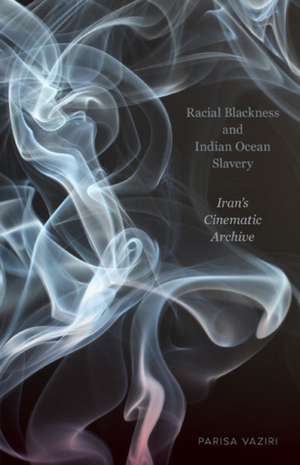Racial Blackness and Indian Ocean Slavery: Iran's Cinematic Archive
Autor Parisa Vazirien Limba Engleză Hardback – 26 dec 2023
Rethinking the history of African enslavement in the western Indian Ocean through the lens of Iranian cinema
From the East African and Red Sea coasts to the Persian Gulf ports of Bushihr, Kish, and Hurmuz, sailing and caravan networks supplied Iran and the surrounding regions with African slave labor from antiquity to the nineteenth century. This book reveals how Iranian cinema preserves the legacy of this vast and yet long-overlooked history that has come to be known as Indian Ocean slavery.
How does a focus on blackness complicate traditional understandings of history and culture? Parisa Vaziri addresses this question by looking at residues of the Indian Ocean slave trade in Iranian films from the second half of the twentieth century. Revealing the politicized clash between commercial cinema (fīlmfārsī) and alternative filmmaking (the Iranian New Wave), she pays particular attention to the healing ritual zār, which is both an African slave descendent practice and a constitutive element of Iranian culture, as well as to cinematic sīyāh bāzī (Persian black play). Moving beyond other studies on Indian Ocean and trans-Saharan slavery, Vaziri highlights the crystallization of a singular mode of historicity within these cinematic examples—one of “absence” that reflects the relative dearth of archival information on the facts surrounding Indian Ocean slavery.
Bringing together cinema studies, Middle East studies, Black studies, and postcolonial theory, Racial Blackness and Indian Ocean Slavery explores African enslavement in the Indian Ocean through the revelatory and little-known history of Iranian cinema. It shows that Iranian film reveals a resistance to facticity representative of the history of African enslavement in the Indian Ocean and preserves the legacy of African slavery’s longue durée in ways that resist its overpowering erasure in the popular and historical imagination.
Retail e-book files for this title are screen-reader friendly with images accompanied by short alt text and/or extended descriptions.
From the East African and Red Sea coasts to the Persian Gulf ports of Bushihr, Kish, and Hurmuz, sailing and caravan networks supplied Iran and the surrounding regions with African slave labor from antiquity to the nineteenth century. This book reveals how Iranian cinema preserves the legacy of this vast and yet long-overlooked history that has come to be known as Indian Ocean slavery.
How does a focus on blackness complicate traditional understandings of history and culture? Parisa Vaziri addresses this question by looking at residues of the Indian Ocean slave trade in Iranian films from the second half of the twentieth century. Revealing the politicized clash between commercial cinema (fīlmfārsī) and alternative filmmaking (the Iranian New Wave), she pays particular attention to the healing ritual zār, which is both an African slave descendent practice and a constitutive element of Iranian culture, as well as to cinematic sīyāh bāzī (Persian black play). Moving beyond other studies on Indian Ocean and trans-Saharan slavery, Vaziri highlights the crystallization of a singular mode of historicity within these cinematic examples—one of “absence” that reflects the relative dearth of archival information on the facts surrounding Indian Ocean slavery.
Bringing together cinema studies, Middle East studies, Black studies, and postcolonial theory, Racial Blackness and Indian Ocean Slavery explores African enslavement in the Indian Ocean through the revelatory and little-known history of Iranian cinema. It shows that Iranian film reveals a resistance to facticity representative of the history of African enslavement in the Indian Ocean and preserves the legacy of African slavery’s longue durée in ways that resist its overpowering erasure in the popular and historical imagination.
Retail e-book files for this title are screen-reader friendly with images accompanied by short alt text and/or extended descriptions.
Preț: 680.78 lei
Preț vechi: 884.12 lei
-23% Nou
Puncte Express: 1021
Preț estimativ în valută:
130.33€ • 134.03$ • 108.12£
130.33€ • 134.03$ • 108.12£
Carte nepublicată încă
Doresc să fiu notificat când acest titlu va fi disponibil:
Se trimite...
Preluare comenzi: 021 569.72.76
Specificații
ISBN-13: 9781517914745
ISBN-10: 1517914744
Pagini: 368
Ilustrații: 48 black and white illustrations
Dimensiuni: 140 x 216 x 20 mm
Greutate: 0.57 kg
Editura: University of Minnesota Press
Colecția Univ Of Minnesota Press
ISBN-10: 1517914744
Pagini: 368
Ilustrații: 48 black and white illustrations
Dimensiuni: 140 x 216 x 20 mm
Greutate: 0.57 kg
Editura: University of Minnesota Press
Colecția Univ Of Minnesota Press
Notă biografică
Parisa Vaziri is assistant professor of comparative literature and Near Eastern studies at Cornell University.
Recenzii
"Parisa Vaziri’s care for Iranian cinema reveals a complex archive—a curriculum, a vigor—that exceeds local abstraction. Its new waves and new particularities are ‘symptoms of the global.’ Her deep analytic concern with racial blackness shows that the absence that makes possible the local and the global is also the presence that disrupts the givenness of self and world. Rigorously, beautifully, Vaziri transforms the history of the Indian Ocean and the history of cinema."—Fred Moten, New York University
"Parisa Vaziri’s Racial Blackness and Indian Ocean Slavery is a truly groundbreaking work that asks us to seriously take up the question: What is blackness in Iranian culture? She critically interrogates the claim that Indian Ocean slavery has largely been forgotten in popular Iranian memory with her illuminating exposition and insightful analysis. Racial Blackness and Indian Ocean Slavery prompts us to do a far better job of exploring the lived experience of blackness in modernity beyond the structures of the Atlantic sphere and to reconsider our thinking about the relationship between slavery, Africa, blackness, and the globalization of the nation state."—R. A. Judy, author of Sentient Flesh: Thinking in Disorder, Poiesis in Black
"Incisive, theoretically rich, and deeply researched, Parisa Vaziri’s Racial Blackness and Indian Ocean Slavery challenges us to see the cinematic material she analyzes in new and striking ways. Crossing conventional disciplinary and area-studies boundaries, Vaziri’s book demands that we rethink the premises of our assumptions about blackness and histories of enslavement in West Asia, especially in Iran."—Amy Motlagh, author of Burying the Beloved: Marriage, Realism, and Reform in Modern Iran
"Parisa Vaziri’s Racial Blackness and Indian Ocean Slavery is a truly groundbreaking work that asks us to seriously take up the question: What is blackness in Iranian culture? She critically interrogates the claim that Indian Ocean slavery has largely been forgotten in popular Iranian memory with her illuminating exposition and insightful analysis. Racial Blackness and Indian Ocean Slavery prompts us to do a far better job of exploring the lived experience of blackness in modernity beyond the structures of the Atlantic sphere and to reconsider our thinking about the relationship between slavery, Africa, blackness, and the globalization of the nation state."—R. A. Judy, author of Sentient Flesh: Thinking in Disorder, Poiesis in Black
"Incisive, theoretically rich, and deeply researched, Parisa Vaziri’s Racial Blackness and Indian Ocean Slavery challenges us to see the cinematic material she analyzes in new and striking ways. Crossing conventional disciplinary and area-studies boundaries, Vaziri’s book demands that we rethink the premises of our assumptions about blackness and histories of enslavement in West Asia, especially in Iran."—Amy Motlagh, author of Burying the Beloved: Marriage, Realism, and Reform in Modern Iran
















